Ashley Stahl is a counter-terrorism professional turned career coach, speaker, and, most recently, author of You Turn, a book about getting unstuck, discovering your career direction, and designing your dream job. Through her two viral TEDx talks speeches (here and here), her online courses and her podcast, she’s been able to help clients in 31 countries discover their best career path, upgrade their confidence, and land more job offers. Her writing appears in a monthly career column in Forbes, and her articles have also been featured in the Wall Street Journal, CBS, SELF, Washington Post, Chicago Tribune and more.
Nir Eyal: Why did you write this book?
Ashley Stahl: This book has been living inside of me since I was a kid, and it wasn’t until now that I felt I had a comprehensive body of work to share with readers on how to discover their most authentic career path. This is the book for anyone who feels like something’s missing at work, or even if they feel like they hate their job and don’t know what else is out there for them. The narrative uses my personal career journey as a tool to educate readers on an 11 step framework they can use to unlock their most effective skill set for the workforce, explore their core values, and learn about jobs they didn’t even know existed. While I started my career in counterterrorism at the Pentagon, I soon realized—like many people do—that after all the hard work I put in, I chose the wrong career for me. The methodology I share in the book is what got me so clear on who I am and where I belong in my career, and this is a gift I want to give readers, too. We spend 90,000 hours of our life at work—that’s two-thirds of our waking time on this planet. I want to help readers make that time at work truly count.
NE: What lessons should people take away from your book regarding how they should design their own behavior or the behavior of others?
AS: Far too many people in the workforce are focused on what their passions or interests are, and what this book does is show the reader the importance of first prioritizing their core skill set in their career choices. Just because you love consuming cupcakes and fashion doesn’t mean you’re meant to be a baker or a designer. Happy consumption doesn’t mean fulfilled production. This is one of many lessons in the book. Another realization I had while writing the book is that we’re misguided by the question of “what do you want to be when you grow up?” This question gets us stuck before we even enter the workforce. But how are we supposed to know who or what we want to be if we haven’t even spent time really experiencing different ways of being in our career? This pressure and question often gets us stuck on the wrong path. A better question is “where do I want to start?” There is so much more inspiration and heart in that question, and it’s the perfect question to ask yourself if you feel lost in any way.
NE: Writing a book is hard. What do you do when you find yourself distracted or going off track?
AS: I realized that those days spent sitting in front of the computer screen, in the thick of writer’s block where no words come out, are just part of the creative process. You need to be lost in order to become found when it comes to writing. If I’m really drawing a blank and feeling stuck, I believe it’s because I feel disconnected. This is when I decide to set aside time to immediately do more of the things that make me feel myself—seeing friends, dancing to hip hop music, going to the beach and putting my feet in the ocean. The more you can get back into your own inspiration and connectedness, the more insight you can bring to the table in your work.
NE: What’s one thing you believe that most people would disagree with?
AS:Following your passion is a horrible idea. I’m passionate about massages and movies, but I’d be a horrendous masseuse or actress. I also don’t believe in the “five year plan”. How can we know where we want to be in five years? We’re changing too much for that. What we can do in our career is simply make sure we’re using our core skill set (something I cover in the book) so that we’re growing and excelling wherever we are.
NE: What’s the most important takeaway you want people to remember after reading this book?
AS: You don’t need clarity; you just need to connect to yourself. When you’re connected to yourself, it’s easy to know what your likes or interests are. From there, choosing your next career move is pretty straightforward.
Related Articles
- Schedule Maker: a Google Sheet to Plan Your Week
- Habit Tracker Template in Google Sheets
- The Ultimate Core Values List: Your Guide to Personal Growth
- Timeboxing: Why It Works and How to Get Started in 2024
- An Illustrated Guide to the 4 Types of Liars
- Hyperbolic Discounting: Why You Make Terrible Life Choices
- Happiness Hack: This One Ritual Made Me Much Happier

